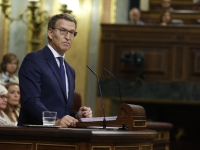Politics
The conservative candidate for Prime Minister of Spain offers six State pacts
For democratic regeneration
USPA NEWS -
“I have come to represent all Spaniards.” With this forceful phrase, the conservative candidate for his investiture as president of the Spanish Government, the conservative Alberto Núñez Feijoo, appeared this Tuesday before the Plenary Session of the Congress of Deputies, the Upper House of the Spanish Parliament. With little chance of being elected, the conservative leader committed to promoting six State pacts: one institutional, another for the economy, a third for families, the fourth for the welfare state, a water pact and another territorial pact, as well as to close the reform of article 49 of the Constitution, “a debt to people with disabilities.”
Núñez Feijoo promised “a true democratic regeneration, ensuring the independence of the institutions, respecting the authority of the Security Forces, and guaranteeing that the Civil Guard does not leave Navarra” if he is elected. Before the investiture debate, he assured that he had the necessary support to be elected president, although he warned that he is not willing to pay the price that some political parties ask of him in exchange.
The conservative leader, who won the legislative elections on July 23, will implement the salary equalization of the Police and the Civil Guard, and will address the improvements agreed upon with prison officials. It will increase the staff of extra judges and magistrates by a thousand in the coming years, it will renew the General Council of the Judiciary (CGPJ in its Spanish acronym) and it will modify the Law so that there are no politicians on the list of the Council, without the possibility of negotiating between parties the Presidency of the Supreme Court. He will also meet the eligibility conditions already defended.
His government program includes the reactivation of the activity and direction of the Spanish Presidency, and he will report to Parliament and address the opening of a parliamentary commission to study the change in position in Western Sahara, to recover consensus on foreign policy. It will reduce taxes on low and medium incomes (with incomes of up to 40,000 euros), it will temporarily extend the reduction of the Value Added Tax on food to meat, fish and preserves, and it will maintain the rest of the measures in force against inflation and the reduced VAT rate on electricity and gas.
The resources from the Bank Tax, Núñez Feijoo announced, will be allocated to families who cannot pay their mortgages. In this sense, he will change the procedure for the Minimum Living Income and will approve a schedule for increasing the Minimum Interprofessional Wage with social agents to reach 60% of the average salary. He announced an extraordinary contribution of 6,000 million euros to reinforce aid to large, single-parent families and the most vulnerable. And he assured that it will facilitate their access to housing, increase conciliation aid and establish free nursery schools from 0 to 3 years old.
The conservative candidate proposed negotiating an Education Law that does not change the next Government; confront school dropouts, for which it established the signing of program contracts with all regions and the promotion of a Tutoring Plan for students who need it. Finally, he committed to the reform of the Senate and to the beginning of a reform of the regional financing system, a new local financing model and the guarantee that all Spaniards have the same services.
Catalonia wants to leave
While the investiture debate of the conservative Alberto Núñez Feijoo as president of the Spanish Government was being held in Madrid, a general policy debate was being held in the Catalan Parliament. The president of the regional government of Catalonia, Pere Aragonés, insisted on his demand for Catalan independence. He assured that the amnesty for all those convicted of the 2017 secessionist attempt “is not enough,” and warned that if the socialist candidate and current acting Prime Minister, Pedro Sánchez, wants to remain in office, he must accept the celebration of a self-determination referendum in Catalonia, and he must accept to be the president “of the rest of Spain” because, in his opinion, Catalonia will become independent in the short term.
Liability for this article lies with the author, who also holds the copyright. Editorial content from USPA may be quoted on other websites as long as the quote comprises no more than 5% of the entire text, is marked as such and the source is named (via hyperlink).






